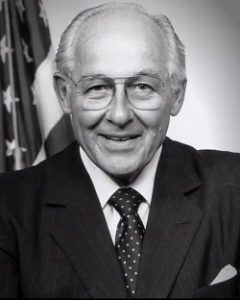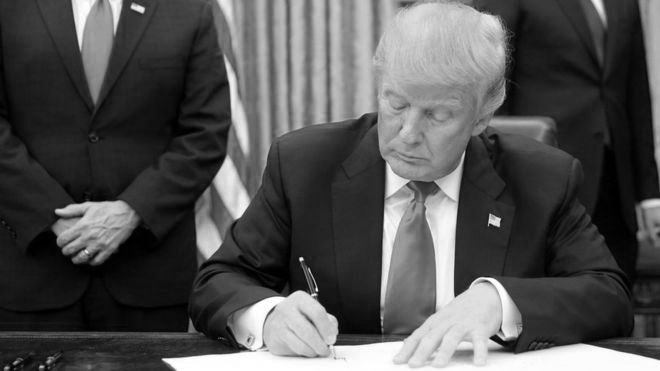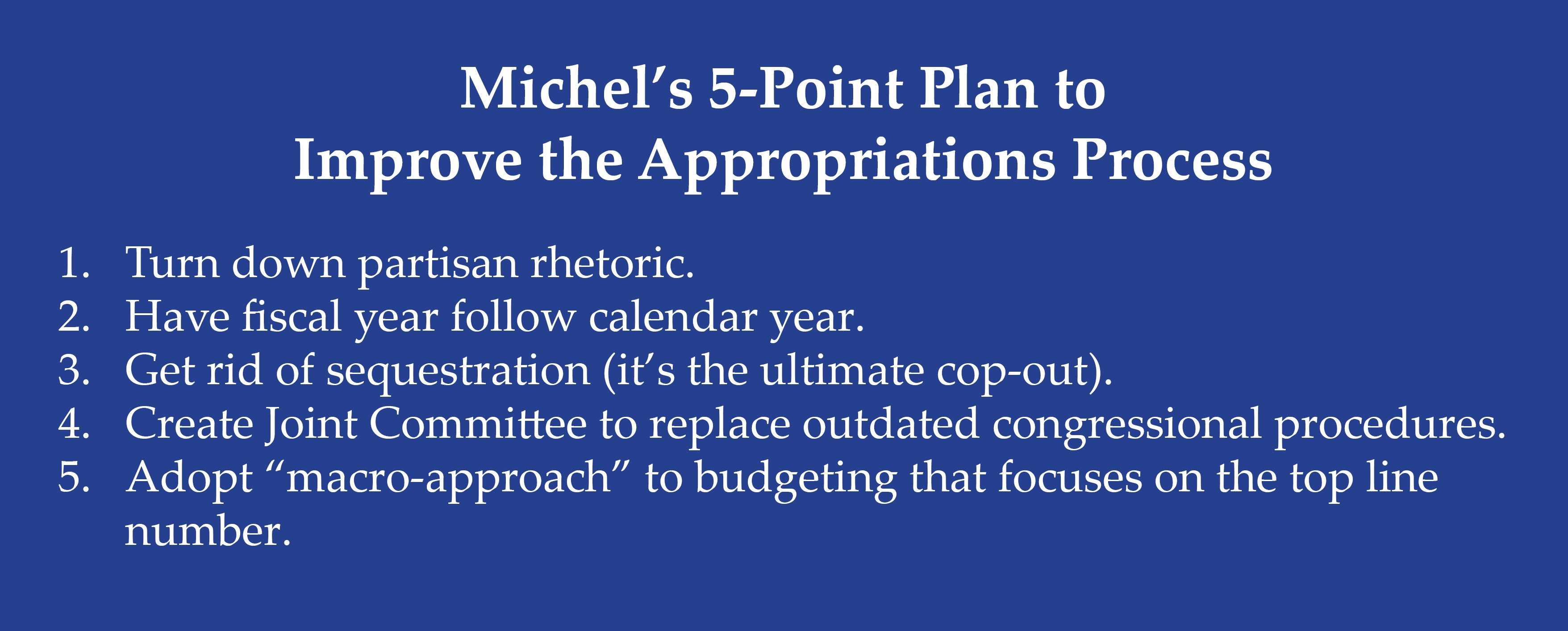
When former House Republican Leader Bob Michel passed away this past February, America lost a true patriot who dedicated his life to serving the public.
Politico called the World War II veteran and 19-term Congressman “the face of decency,” while the Chicago Tribune mourned him as “a congenial lawmaker adept at crafting compromise during a bygone era of bipartisan cooperation.”
Make no mistake – Bob Michel was a gentleman, as these reports and many others pointed out. But he was also a shrewd legislative strategist whose easygoing temperament masked not only an encyclopedic knowledge of the House rules, but a willingness to use these rules for partisan advantage if he thought it was in the best interest of the nation to do so.
In addition to spending 14 years as Republican Leader, Michel was a longtime member of the Appropriations Committee. His instincts as Leader were informed by this experience, and he viewed Appropriations as the most bipartisan Committee on Capitol Hill. In light of today’s political gridlock — and the need for Congress to reassert its role as a coequal branch of government — one could argue that Michel’s experience, insights, and approach to legislating are needed now more than ever to fix what most agree is a broken budget and spending process. So as his former colleague and as his former aide, we decided to ask the question — what would Michel do?
In light of today’s political gridlock — and the need for Congress to reassert its role as a coequal branch of government — one could argue that Michel’s experience, insights, and approach to legislating are needed now more than ever.
First, he would remind us of how the modern budget process was created – as a result of the Presidential impoundment of funds and a subsequent debt limit fight. This reinforced the efforts of a Democratic-controlled Congress to develop its own budget, separate and distinct from that of the President. He’d also point out that the most basic responsibility of elected representatives is to provide funding for the operations of government.
The Congressional Budget and Impoundment Control Act was enacted in 1974, with the hope that it would enable the legislative branch to set its own economic and budget goals. Ruling the House for several decades, Democrats viewed the “legislative” agenda from a party perspective and the budget process was expected to be no different.
However, it was not until the Reagan administration that the Budget Act was profoundly tested. Bob Michel played a central role in the budget battles of that era — battles that quickly became partisan rather than institutional.
It was in 1981 that Bob, as the newly elected Minority Leader with 192 members of the House Republican Conference, used the Budget process to enact President Reagan’s first spending blueprint.
Using the Act’s expedited rescission procedures for the first (and only) time, Bob threatened to bring up the President’s proposed spending cuts. Rather than lose control over the floor, the House Democratic leadership agreed to a deadline for action on the President’s agenda of spending cuts and tax reform, in exchange for which Republicans abandoned the use of the expedited rescission procedure.
It was in 1981 that Bob, as the newly elected Minority Leader with 192 members of the House Republican Conference, used the Budget process to enact President Reagan’s first spending blueprint.
Reconciliation became the battlefield and has had an outsized impact on budget debates ever since – to the point where it has dominated party strategy. The addition of automatic budget procedures such as “sequester” have only compounded the mess and adversely affected long term planning.
In the last decade, few “congressional” budgets have been finalized, and the basic funding of government through appropriations has become an abysmal failure of Congress. Congress regularly has had to pass both short-term continuing resolutions and finish the fiscal year with omnibus (multi-bill) appropriations. Federal and state governments have had to operate on the principle of planned inefficiencies because of the failure of Congress to do its job.
So, facing this record of congressional budget failure, what would Bob do?
Bob Michel would probably say we first need to turn down the heat of partisan rhetoric and recognize that the timelines of today’s process do not accommodate the realities of today’s political system.
The fiscal year should be fixed to better coincide with the calendar year. For the last decade, this has been essentially the case as most funding decisions have regularly been delayed until December. He would change it to begin on January 1st.
Sequestration should go; it is the ultimate cop-out. The Congress needs to learn how to make choices rather than place critical decisions on automatic pilot.
While focusing first on making the budget process work to improve the economy and meet the needs of all Americans, Bob would strongly support a joint committee to look at congressional processes as a whole. He’d want Congress to use the committees to develop legislation and then reform the conference committee process to engage the Members with subject expertise in the development of final House-Senate agreements on legislation.
 President Trump should recognize — as Michel’s efforts in 1981 highlighted — that the budget law gives him the authority to propose individual rescissions to reduce spending. That’s the equivalent of a “line item veto.”
President Trump should recognize — as Michel’s efforts in 1981 highlighted — that the budget law gives him the authority to propose individual rescissions to reduce spending. That’s the equivalent of a “line item veto.”
Bob also talked of the House and Senate Budget Committees developing the top line numbers only — specifically, the amount of revenues, the total budget authority for discretionary and “mandatory” expenditures, and the resulting deficit or surplus. They would also decide whether mandatory programs should be addressed using reconciliation instructions to committees. But it would not be until the conference committee where functional categories would be finalized as part of the conference report. (There is really no purpose for having a defined set of functional categories of spending at the initial stage of considering budget resolutions, as ultimately it is the responsibility of the Appropriations Committee.)
This “macro” budget approach would facilitate the two houses quickly adopting a budget resolution that initially could also instruct committees on tax reform or changes in mandatory spending. The resolution would also give the appropriations committees a “top line” number to subdivide to meet the individual programmatic needs of government.
By establishing the “top line” numbers on spending at the outset, appropriators would be given more time to outline and prioritize spending in the individual bills. As a former appropriator, Bob envisioned them having a greater role in finalizing these numbers to strengthen oversight of the details of government programs.

How would he suggest they do this? One suggestion would be to have the two Appropriations committees agree on what the final functional categories for spending should be immediately after a budget conference between the House and Senate is finalized.
As the Congress moves back to adopting 12 individual appropriations bills, President Trump should recognize — as Bob Michel’s efforts in 1981 highlighted — that the budget law gives him the authority to propose individual rescissions to reduce spending. That’s the equivalent of a “line item veto.” Since the Budget Act allows 1/5th of each house to force a vote to act on each rescission the President proposed, this sets the stage for executive-legislative fights over discrete issues, not make-or-break veto ultimatums with the looming threat of government shutdowns.
Congress needs to vote more, not less, so their choices can be made clear to the people who elected them. That is who Bob Michel knew he worked for – a credo that should govern the actions of all legislators.
Tom Tauke represented the 2nd District of Iowa in the U.S. House of Representatives from 1979 to 1991. He currently serves as Chairman of The Ripon Forum’s Editorial Board. Billy Pitts is a former top aide to the House Republican Leadership and Staff Director of the House Rules Committee. He also serves as a member of the Forum’s Editorial Board.




